
Vol. 1, No. 5 Published by India China Division, Air Transport Command Feb. 15, 1945

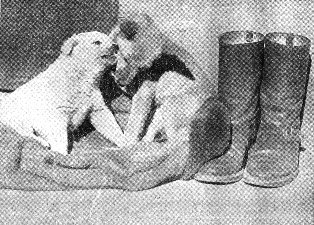 "Sweet oblivion to the cares of this wicked world," well might be the title for this unique photo snapped at the 1343
BU, China, by an ICD cameraman. The pups pick out a comfortable spot on their master's fur flying jacket (worrying not
a bit about the woeful lack of dry cleaning facilities in China) and calmly gnaw on each other, under the warm Yunnan
sun.
"Sweet oblivion to the cares of this wicked world," well might be the title for this unique photo snapped at the 1343
BU, China, by an ICD cameraman. The pups pick out a comfortable spot on their master's fur flying jacket (worrying not
a bit about the woeful lack of dry cleaning facilities in China) and calmly gnaw on each other, under the warm Yunnan
sun.
|
Yank Fields in China
Cleared In Day's Time
'Sylvester's Circus' Removes All Equipment
in Face of Japs
ICD BASE, CHINA - Flying in the face of imminent Jap air and ground attack, the newly organized Second Air Transport squadron (mobile) evacuated American airfields at Suichwan and Kanchow, accomplishing the mission without loss in less than 24 hours, it was revealed this week.
the ICD squadron, dubbed "Sylvester's Circus" and flying under command of Maj. Frank Sylvester, Santa Barbara, Calif., received orders calling for utilization of 15 C-46A transports to proceed from the 1343rd BU and shuttle men and material.
Ready in Three Hours
Japanese ground and air forces were converging on Yank installations at Suichwan and Kanchow, in Kiangsi province, hoping to knock out the bases which had been sending aircraft to attack Nip communication lines and installations.
First call was received at 5:30 p.m. on Jan. 21, and plans called for the first takeoff at 2 a.m. the next morning, with the remainder of the mission fleet scheduled to leave the ground as soon as possible. Within three hours after the orders arrived, Sylvester's Circus was ready to fly.
First Cargo Leaves
At 2:10 a.m. the first aircraft was wheels-up for Suichwan, with the other 14 ships following at 20-minute intervals. The transports flew in radio silence, sweating out not only the customary hardships of difficult terrain, sudden storms and adverse winds, but also some 130 miles of enemy-held territory without fighter support.
The route led through a triangle of enemy fighter bases concentrated at Lingling, Hengyang and Paoching, but the aircraft passed over the Jap airfields in broad daylight without interference. Crews attributed their good fortune to the element of surprise and the support of the 14th Air Force fighters which flew against enemy installations in incessant sorties until noon. The pursuits used spare fuel which the transports brought with them in drums.
First of the fleet of C-46's reached Suichwan 3 hours and 10 minutes after takeoff and began the shuttling of personnel and engineering, medical, photographic and miscellaneous equipment to the Kunming area.
Cargo earmarked for evacuation had been dumped in the middle of the airfield between the taxi strip and runway. Capt. T. A. Miller, of P&T; Lt. Harry Dilts, his assistant, and four GI's handled the loading. They did their weight and balancing work on the spot. Cpl. Jack Blincoe, operations clerk, pinch-hitting for space control, checked passengers and equipment. The evacuees, bomb-weary but cool, posted themselves as enemy plane spotters before and during the flight back to safety.
Last Planes Depart
Through the day and into the late afternoon, the arduous job continued, as ground crews struggled with bulky, unwieldy cargo and fliers fought sluggish controls of the planes loaded beyond ordinary allowances.
The last plane departed from Suichwan at about 4 p.m. with the sound of Japanese gunfire rumbling in the distance. The final transport left Kanchow at 5 p.m.
The mission was accomplished without loss of a ship or a piece of cargo. When the "circus" departed, all unmovable equipment and construction had been destroyed.
At midnight Maj. Sylvester landed at his base with the last plane load of cargo, the 1,500 mile round trip completed, 22 hours after the first ship had taken off.
Hand-picked Crews
The terse report - "Mission accomplished: 15 ships, each completing mission successfully" - only told part of the story.
Lt. George W. Shoemaker, Cusick, Wash., assistant chief pilot, holder of a civil engineering degree and a topographical engineer on the Coulee Dam project as a civilian, worked feverishly on let-down maps of the four American airfields over which the squadron had to fly in the mission and on which they might have to land. With Lt. H. B. Williams, Oswego, N.Y., assistant operations officer, aiding him, Lt. Shoemaker put to use technical information furnished by the 14th Air Force in preparing the maps.
Quick Thinking Saves Luckless Fuel Transport
Gasoline Pumped From Cargo Keeps Plane Aloft 15 Hours
1345 BU, INDIA - Her own cargo, coupled with the cool-headed performance of her crew, kept a C-54 aloft for exactly 15 hours last week until she finally broke out of a storm to find a place to land.
With the liaison transmitter and radio compass useless, the radio operator, Pvt. Donald K. Pierce, sweated over his set attempting to establish contact with the ground. In the cockpit, the pilot, Capt. Frederick M. Mills, and the co-pilot, 1st Lt. William W. Wetzel, used every flying trick they knew to come out of the storm. The engineers, Sgt. F. A. Kliembriel and Pvt. William D. carter, watched the ship's instruments - saw her gauges indicate a critically low fuel reserve.
Realizing that if the gasoline in the cargo compartment could be transferred to the tanks, the C-54 could be kept aloft almost indefinitely, the engineers cast around for a means of accomplishing this.
They found a piece of hose in the rear of the plane. Shoving one end of the hose into one of the gasoline barrels and the other into the fuselage tank, they pumped barrel after barrel of gasoline to replenish the constantly-decreasing reserve. By the timer her gear touched a familiar airstrip in China, 20 barrels of gasoline had been pumped from the C-54's cargo compartment to the power plants.
After the ship landed, the pilot, Capt. Mills, expressed his admiration for the two engineers thus: "By their presence of mind and hard work, pumping gasoline, these two boys saved the ship and us. For my money, they are strictly OK."
Most of Them Jump Into Trenches; He Jumps Out
1344th BU, CHINA - Jumping into a slit trench under certain conditions would come natural to most men, but it remained for Sgt. Ellwood F. Smith, Secaucus, N.J., to try a new angle during an air raid here recently when he jumped out of the sod as the Japs hit this ICD base with everything but their kitchen sink.
Directly after the lead enemy ship had dumped its eggs, Smith noticed that a B-29 some hundred-odd yards away had been hit and was beginning to burn. Snaking their way out of the trench, Smith and two companions from a nearby bomber unit made the big bomber in a burst of fast rushes, grabbed fire extinguishers and started working on the blazing left wing and No. 1 engine.
Leaking gasoline from the left engine could have exploded at any second, but the boys doggedly persisted in their finally successful attempt to kill the flames.
As they hit the slit trench the drone of approaching planes signaling the beginning of additional bombing runs lent strength to their fingers, and they dug in a little deeper perhaps than the maximum permissible depth of safety. The three stout hearts sweated out the remainder of the raid from the prone position.
Division is Big Employer of Civilians; Many are Specialists
HQ., CALCUTTA - ICD has gone into the civilian personnel business in a big way, with increasing emphasis on replacement of GI's for reassignment to more important duties or needed bases.
According to figures just revealed, approximately 25,000 civilians were employed by the division in January. Widescale recruiting and training is being carried on, particularly in urban areas where stenographers, typists and clerks are available in numbers. At HQ alone, 67 civilians are used in those capacities.
Plans are also being formulated for training Indians for assignment as skilled and semi-skilled technical workers in production line maintenance at Assam and Bengal bases. Several bases in western India already employ skilled mechanics, welders, painters, smiths and other specialists.
It is now a normal sight when a Mr. Ghosh and a Mr. Chatterjee arrives in Indian costume to do their day's stenographic duty, but they do their jobs - and well, too. So accustomed have GI's become to such goings-on that no one batted an eye recently when a male civilian typist reported for duty each morning unshaven, and without shoes. He was mourning a deceased parent, according to his religious custom. And then, there's always the morale factor when Maizie Muckerjee checks in for a day's work and settles herself at a desk next to GI Joe!
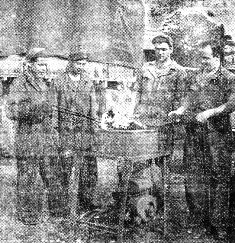 Sgt. William R. Griffing, of the 1327, (left) demonstrates to a few colleagues the forge he constructed from various
junk to relieve an acetylene shortage at the motor pool.
Sgt. William R. Griffing, of the 1327, (left) demonstrates to a few colleagues the forge he constructed from various
junk to relieve an acetylene shortage at the motor pool.
|
No Welding Outfit So Sgt. Gets Busy, Builds Own Forge
1327 BU, ASSAM - Necessity again mothered invention at an ICD base when Sgt. William R. Griffing, of the motor pool, found that scarcity of materials was forcing the pool to operate without the services of a welding outfit.
Scouring the base, he came upon a putt-putt motor with a damaged magneto, lying in the junk pile. More rummaging unearthed a fan belt from a wrecked British ambulance, a section of a Chevrolet chassis, a hose from a plane heater, a gas drum and an angle iron.
From these discarded parts, Griffing set about assembling them into a small, compact forge which today serves the welding shop in lieu of a manufacturer's model. The inventor admits it will not rival the efficiency of acetylene, but it definitely relieves the critical shortage and expedites repair work.
Sgt. Griffing, an 18-monther, hails from New Orleans.
If You're After Dirt, Just Read This Li'l Yarn
1327 BU, ASSAM - Though there is no way of determining the claim at present, this base boasts India's only U.S. soil.
Returned to the States last year to attend the Special Service Orientation School, Cpl. Maurice Granger pondered all the while on a suitable gift he might bring back.
Cpl. Granger recently returned to this station in Assam, a wiser man for his course in orientation, and a happier GI because his problem had been solved. Clutching a tin can filled with the soil of Virginia as he descended from the plane, he announced that the earth he had brought would be strewn over a certain area of the base. Everyone, he said - even including officers - would be permitted to stand on that soil for one minute, in awed silence.
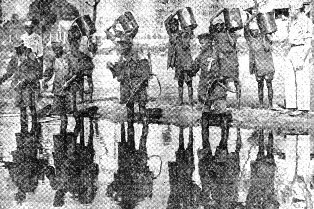 Under the direction of a Malaria Control unit GI, a group of Indians spray a stream to rid it of anopheles mosquitoes and
other winged insects. Since the arrival of the unit in one of India's worst malaria regions, the mosquito constantly has
been going down for the count. The rate of afflicted GI's has been lowered considerably.
Under the direction of a Malaria Control unit GI, a group of Indians spray a stream to rid it of anopheles mosquitoes and
other winged insects. Since the arrival of the unit in one of India's worst malaria regions, the mosquito constantly has
been going down for the count. The rate of afflicted GI's has been lowered considerably.
|
Malaria Control Unit Is
Winning Against Annie
1326 BU, ASSAM - Everyone has heard of the mathematical bug which subtracts from your pleasure divides your attention, adds to your woes and multiplies like hell.
However, the story of those who counteract this proverbial bug - as yet, has not been fully told.
At this base the alert malaria Control unit has constantly been fighting a discouraging but winning struggle against the anopheles mosquito and other winged killers.
One of the more effective outfits in this line, the unit consists of one officer and 11 enlisted men. The unit is commanded by Capt. John C. Oliver, Sanitary Corps, T/Sgt. John Maughan; Sgts. Fred Craig and Basil Willis; T/5s Edward Daly, Woodland Drake, John Gaspar, Harry Schectel, and Pvts. Robert Johnson, Charles Leonard, Ervin Metzger, and James O'Brien make up the unit.
How well they have succeeded is attested by medical statistics which show a dwindling number of malaria cases reported monthly. During the past year less than a score of ICD personnel was stricken at the base to which the unit is attached.
Employing hundreds of Indians, malaria control is the jack-of-all-trades. It supervises the clearing of brush, drainage of swamps, and the ferreting out of mosquito larvae wherever they may be found. The unit also patches up and screens buildings as to make them mosquito proof and each evening sprays all buildings with aerosol bombs.
'I Wore Out More Mess Gear Than You Have Shoes'
1307 BU, NEW DELHI - There was a certain swagger about the corporal as he got off the plane here. The hash mark on his arm stood out like 96-point type in the New York Times.
Entering the restaurant, he took a seat at the counter beside a little master sergeant who was reading a newspaper and drinking coffee. The corporal ordered hamburger and eggs. Then as he began to push food into one side of his mouth he talked out of the other.
'Not Quite 26'
"Thirty-eight months in this uniform, I got," he bragged. "How long you been in?"
The master sergeant didn't look up from his paper. "Not quite 26," he said.
"That's the Air Corps for you," the corporal moaned, "I've got more time in grade than you've got in the army."
Arm-load of Stripes
The master sergeant folded his paper and walked to the coke bar at the other end of the restaurant. Turning to another GI who had just come up, the corporal continued to rave. "What a racket you ATC fellows got," he said. "Take that guy in the field jacket over there. Less than 26 months and already an arm-load of stripes.
"You must be skipping a check point," the GI interrupted. "That's Clifford Day, and he's been in the army 25 years!"
GIs Get Soldier's Medal for Heroism Displayed at 1348th
1348th BU, NORTH BURMA - Four members of this command were awarded the Soldier's Medal recently for acts of heroism performed at an advance base in India.
Cpl. Clarence Dorris, of Greenbrier, Tenn., and Pvt. Cloyd E. Martin, of Central, Ariz., members of an attached MP unit, received the award for heroism displayed when a transport crashed and burned with all crew members aboard.
"With complete disregard for personal safety," read the citation, "they entered the burning plane and assisted in removing the survivors, despite the possibility of a gasoline explosion and although in imminent danger from exploding ammunition and oxygen tanks."
Sgt. Arthur E. Hawkes, a member of the MP unit at the time of the accident, received the medal for heroism displayed in connection with the same incident. Sgt. Hawkes is now attending OCS in Uncle Sugar.
Pvt. Sterling Beswick of Central, Ariz., received his Soldiers' Medal for "voluntarily risking his own life in bodily removing a soldier from a flaming gasoline storage area."
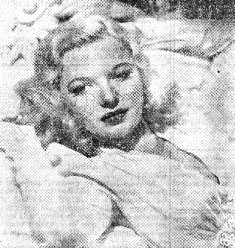 Improving its research this week (see "Editor's Mailbag") HUMP EXPRESS offers basha pin-up hounds a girl with a name
- and lots else - dazzling blonde Paramounter Marjorie Reynolds.
Improving its research this week (see "Editor's Mailbag") HUMP EXPRESS offers basha pin-up hounds a girl with a name
- and lots else - dazzling blonde Paramounter Marjorie Reynolds.
|
Assam's Own University
Features Former BC Prof,
Any Course a GI Desires
Traveling Laboratory, on-the-spot Courses, Registrar,
All Are Part of the Highbrow School Headed by Sgt. R. J. Cahill
1328 BU, ASSAM - The twist of playing up a U.S. Armed Forces institute program as a college or academy is not new - the practice is common among Assam bases.
What is unusual is the unadulterated gall of the 1328 BU in not only going all-out by affixing to its program the sacrosanct title of "university" but openly boasting that graduates from other base "colleges" and "academies" could apply for admission to Assam university at the completion of their studies in the "lower" seats of learning.
With the supreme impudence of an upstart, a bunch of the boys at 1328 blithely announced last week the "incorporation" of their "university"; cockily designated Sgt. Robert J. Cahill, former Boston College teacher, president of Assam University, gave Sgt. Joseph C. Nappi, who holds a master's degree from Ohio State, the job of registrar, with additional duties as Dean of Women.
Nay Undertaking
Pointing to the fact that 15 percent of the base already is enrolled in either a self-teaching or a group study course, "Assam U" boasts a curriculum that embraces almost everything from rudimentary readin' and writin' to the most profound college courses. The only course not available to GI's so far is one requested by several would-be morticians - undertaking.
However, on all other counts the university has been able to meet the demand. Sgt. Cahill teaches beginners' German; T/Sgt. Lucas D. Gonzalez, of the El Paso Technical Institute, teaches physics; Pfc. Jesse W. Tennison, who taught radio and flew for Pan-American airlines teaches radio; Cpl. Walter C. Stonestreet, an accountant, is the university's professor of bookkeeping and accounting, and Pfc. William E. Moss, chemical engineer, is mathematics and science prof.
A former mess hall has been converted into a classroom complete with blackboard, desks and chairs and is used day and night by the ever-expanding university.
Traveling Lab
Colorful and unorthodox Robert Hutchins, of the University of Chicago, has nothing on the two enterprising sergeants, Cahill and Gonzales. The latter carries his own laboratory to his classes in electricity; one of his pets is a cut-away wet cell battery which he uses in his demonstrations. In addition, he adjourns his class to various spots on the base for realistic demonstrations of generators, wiring techniques, and other facilities actually in operation.
The indomitable Irishman, Cahill refuses to be stumped when the generator which supplies power for classroom lighting goes out and takes his illumination with it. He simply switches from writing German conjugations, or whatever the class is doing at the time, to pronunciation exercises, basing the switch on the accepted theory of blocking out all senses but those actually involved in the lesson being learned.
Station VU2ZS Going Places - 3 Watts to 50
Sgt. Fishman of 1327 BU Hopes for All-India Coverage
1327 BU, ASSAM - A 50-watt transmitter can't quite compare with NBC or CBS but it is definitely better than none.
Anyway, that's the opinion of the founder and program director of radio station VU2ZS, Sgt. Lawrence J. Fishman, and his listeners. And, if ambition is any indication of the future, the present 20-mile radius of the station someday will grow to an India-wide coverage.
Clamored for More
Early in 1944, when the quality of motion picture films playing this circuit was low and touring USO shows were a rarity, the idea was conceived of building a small transmitter to lighten the dreary evening hours with popular band recordings.
Housed in the center of the enlisted men's quarters, the 3-watt transmitter went into use. Though its beam was pitifully weak, noises from adjacent bashas were picked up by the mike and the innovation was a success.
In October, 1944, permission was received from the authorities to increase the power to 50 watts. This was the birth of station VU2ZS.
Using salvaged radio equipment, Sgt. Jay Bronson built the transmitter . A spacious brick building was pressed into service as a studio. Its interior displays a professional touch. Two studios have been constructed, separated by a glass panel, purchased at the expense of Sgt. Fishman. Studio "A" is the radio control room. Studio "B" is used for "live" programs.
Broadcasts from Theater
With its present power VU2ZS is capable of beaming out 20 miles. The station is on the air 49 hours a week. At 9 a.m., dictation-speed news summaries are broadcast for orientation departments, with several more news periods through the day.
Other hit shows are songs by a popular quartet of Negro singers and hymns by the chapel choir, led by Sgt. B. Campbell. The swing variety consists of a jazz period featuring Cpl. Lee Gould and Turntable Tropics, a period of canned popular music. There are also summaries of novelty news happenings on the base and remote control broadcasts from "Grumman's Assamese," this base's renowned outdoor theater.
Assisting Fishman at the station are Sgt. Eddie Bauer, a well-known entertainer in pre-war days and a fixture of GI shows here; Cpl. William Burch, control engineer, and Pvt. Robert Lewis, script writer and announcer.
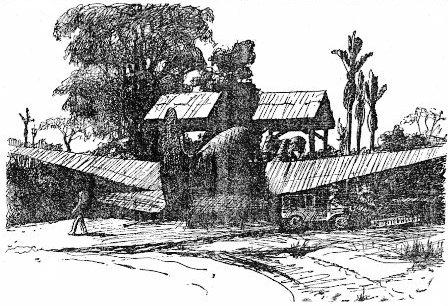 Here's a pen drawing which shows how a split-nose hangar looks to the artist, Capt. James P. Scott, headquarters
officer who has been traveling to ICD bases to sketch operations and personnel. He caught this transport undergoing
a 100-hour inspection, with its twin engines sheltered from the elements by the unique hangar. His pen caught details
of the betel nut palms which make up part of the tropical growth in the area of the Assam base where the sketch was made.
Here's a pen drawing which shows how a split-nose hangar looks to the artist, Capt. James P. Scott, headquarters
officer who has been traveling to ICD bases to sketch operations and personnel. He caught this transport undergoing
a 100-hour inspection, with its twin engines sheltered from the elements by the unique hangar. His pen caught details
of the betel nut palms which make up part of the tropical growth in the area of the Assam base where the sketch was made.

Monkeys is not da cwayzies' peepu no moah! Havin' obzolved da pickshas in da Febwuaway Eight' numba a da HUMP EXPWESS showin' ewaphums woadin' C foughty six ayahcwaft wid gasowine dwums t' fwy da Hump, it is my bweef dat ewaphums is now da cwayzies' peepu. Aw puhaps edidahs a da GI noosepaypahs is even cwayzia. Since I have woaded hunids a ayahpwanes in vawious pahts a dis countwy duwin da pas' two yeahs and not seen no ewaphums woadin' nuttin' naw cawyin' nuttin', I beweeve da edidahs is da moah pwobabu. But wedda ewaphums aw edidahs has taken deah pwace, I wepeat, monkeys is no wonga da cwazies' peepu. (Soiviceman's Handle Widheld) Ed.- We hoid ya da foist time. |
|
Whoever did the original make-up for HUMP EXPRESS should learn a little more about ICD. The name-piece, showing a plane flying over the Hump from India to China, should have a C-46 instead of a C-47 making the run. It's the C-46 that's doing the job. Sgt. Louis Weinstein, 1333 BU Ed.- The C-46 is doing a great job. But don't forget the "old reliable," the C-47, was the pioneer! Also, it's known universally as the "workhorse" of the AAF, and it's still doing a mighty big job in ICD. C-87s and C-54s fly the Hump, too. HUMP EXPRESS is still in its infancy, but I believe in the very near future it will be the leading newspaper in the CBI area. Any GI would be proud to send it to the home folks. Cpl. Nathan Hoffman, 1327 BU Ed.- Gosh! Thanks. |
|
A recent issue of "Air Force" said that units of 250 personnel or more could have their own insignia. Wouldn't it be a good idea for HUMP EXPRESS to start a campaign for a special ICD insigne for flight jackets and other clothing? How about it? Cpl. Ned Winslow, 1333 BU Ed.- A recent decision prohibits special ICD insignia for clothing, but an ICD insigne for the noses of divisional aircraft has been approved and is in the mill. The picture, "Whozit?" on page three of the Feb. 1st EXPRESS is Betty Hutton. How do I know? Well, she gave me one just like it, and also wrote on it, "To Wade, A Swell Guy. Sincerely, Betty Hutton" Shame on you. S/Sgt. Wade M. Massingill, 1328 BU Ed.- We weren't so fortunate. Betty did not sign the picture sent us. |
|
Congrats on the start of a swell newspaper. It has almost everything. All it lacks is a good poem. I am sending you that poem, hoping to see it in a future issue. It will act as a come-on for other ICD poets. Here's hoping you like it. I know my buddies in the basha got a kick out of it. Cpl. Victor E. Persico, 1345 BU Ed.- Here's Cpl. Persico's poem. We too hope it serves to encourage other ICD poets. |
|
This is the place they call our home - A place to rest, though our minds may roam. They call it a basha, Lord knows why; A primitive silhouette against the sky. The walls are of bamboo, the roof of hay, Can't say it's a bad place in which to stay; It looks picturesque by the light of the moon. But one thing I dread is the coming monsoon... |
|
Our cots are so made you can't sleep "like a log," So unskillfully made by our bearer, "Eggnog." We'll get rid of him and hire another- By the end of the week we'll be trying his brother. Our basha can never take the place of home; It's like drinking a beer that has no foam. But why worry now? Let's all sing a tune; Lord help us get back by the coming monsoon! |
 "You talk about there being no atheists in foxholes - there are none in the air tonight . . . I really did
some praying." -
"Flying the Hump will make a Christian out of you. There are times when every pilot earnestly calls on
his God."
"You talk about there being no atheists in foxholes - there are none in the air tonight . . . I really did
some praying." -
"Flying the Hump will make a Christian out of you. There are times when every pilot earnestly calls on
his God."
These are a few of the statements that the chaplain has heard. The men who fly the Hump and who fly in China believe in God. They are not ashamed of their faith. Their expressions of faith are spontaneous.
Just as real as the faith of the men who fly is the faith of the men who keep them flying. Maybe their faith is a little more reserved, but it is just as real.
There is a most friendly attitude on the part of officers and enlisted men alike toward the chaplain. He is welcomed at all times by all men. They appear to appreciate his presence. This is based not on the personality of the particular chaplain involved, but rather on what he represents.
At the services (Protestant) the men select their own hymns. Here again there is an unconscious expression of faith. Vital songs with real meaning are invariably selected. Some typical selections are: "What a Friend We Have in Jesus," "Rock of Ages, Cleft for me," and "I Need Thee Every Hour." Also, it is interesting to note that often hymns of an invitation nature are requested. Typical of these are "Just As I Am, Without One Plea," and "I Can Hear My Savior Calling."
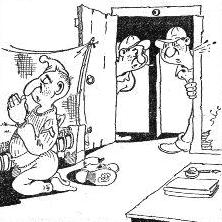 "He must be praying for corporal!"
"He must be praying for corporal!"
|
Recently a movie entitled: "The Power of God" was shown. The enthusiastic reception of this religious film was another expression of faith.
There is likewise a desire for religious literature. Every time a man asks for a piece of religious literature or a Testament, that is another quiet manner of saying he believes in God.
A letter is received. It is from a pastor of the church back home. Spontaneously the letter is shown to the chaplain. The soldier wants his chaplain to know that he is not forgotten by his home pastor. Again, this little act is an outward expression of faith.
Yes, the average American soldier serving in China, or making regular trips to China, has a definite faith in God. His outward conduct may not always harmonize with his inward faith. Nevertheless, beneath the camouflage is a strong, positive belief. In the time of crisis, the faith comes to life. Perhaps the beliefs of this average American soldier would not be considered altogether "orthodox" when measured by a Church creed or doctrine, but this does not diminish their reality.
The man who flies the Hump knows there is no atheist in the air. Likewise, the average American soldier in China believes in God.
CHAPLAIN SHEPPARD BRYAN, 1340 BU, China
 (At the left) A sack of mail is being lifted from a mail truck into the cargo door of a C-46 Curtiss Commando at
one of the division's Hump "springboard" stations in the Assam valley. (In the center) The glare of landing lights
from a plane which has taxied out on its way to the warm-up circle reveals a long line of C-46's and 47's assembled
in dispersal areas behind it, while just beneath the ship in the immediate foreground can be seen the sharp trail of
light left on the film by the departing plane as she drew away from the revetment on her way to the taxi strip.
(At the right) GI's at a passenger terminal look almost happy enough to be on their way to the United States, as they
"wrassle" baggage onto a weapons-carrier with the help of coolies.
(At the left) A sack of mail is being lifted from a mail truck into the cargo door of a C-46 Curtiss Commando at
one of the division's Hump "springboard" stations in the Assam valley. (In the center) The glare of landing lights
from a plane which has taxied out on its way to the warm-up circle reveals a long line of C-46's and 47's assembled
in dispersal areas behind it, while just beneath the ship in the immediate foreground can be seen the sharp trail of
light left on the film by the departing plane as she drew away from the revetment on her way to the taxi strip.
(At the right) GI's at a passenger terminal look almost happy enough to be on their way to the United States, as they
"wrassle" baggage onto a weapons-carrier with the help of coolies.
Twenty-four hour flight from India to China is no longer an experiment, but a consistent procedure. Almost half of all flights are now made in darkness. All through the night, people like those shown here are at their work. All through the night, the
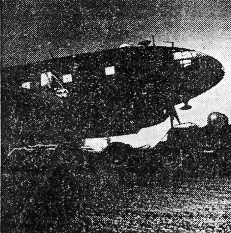 A visit by mechanics to a transport airplane which is being serviced for a night flight over the Hump, is chronicled by
their flashlights, both beneath the ship where they have walked and on the top of the wing were they have been working.
A visit by mechanics to a transport airplane which is being serviced for a night flight over the Hump, is chronicled by
their flashlights, both beneath the ship where they have walked and on the top of the wing were they have been working.
|
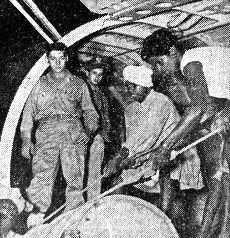 Coolies push and pull to get a drum of gasoline into a transport, where it will be tied down securely under the direction
of the enlisted cargo supervisor at left and checked out by the officer in charge of the loading, who stands behind him.
Coolies push and pull to get a drum of gasoline into a transport, where it will be tied down securely under the direction
of the enlisted cargo supervisor at left and checked out by the officer in charge of the loading, who stands behind him.
|
It is almost a year and a half since steady operation across the Hump on a round-the-clock basis was undertaken. Milestones in aviation history have been passed during the perfection of this gigantic project. Every man who shares in it, coolie or command pilot, is part of an epic.
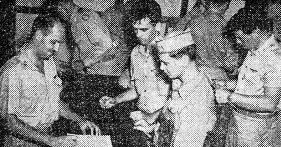 Pilots gather at an operations desk in Assam for clearance and instructions, before taking off on China flights.
Pilots gather at an operations desk in Assam for clearance and instructions, before taking off on China flights.
|
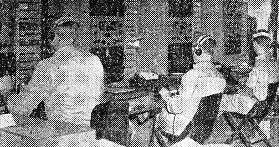 A communications team works through the night at an ICD base in northern Assam, maintaining the radio network that has
transformed the hazardous night route from a barnstorming venture into a modern airway.
A communications team works through the night at an ICD base in northern Assam, maintaining the radio network that has
transformed the hazardous night route from a barnstorming venture into a modern airway.
|
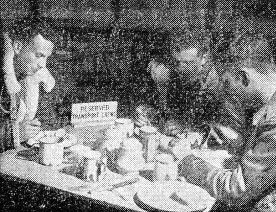 Three crew members (one man must stay with the plane) of a C-87 Liberator Express bring lusty appetites to a flock of
"flied eggis" at a China field after delivering their cargo. This is an evening meal, for the fliers left behind them a
steaming noonday in India and landed in a bleak, chilly Chinaside afternoon. The ship serviced, they will return to
India in darkness. Sign indicates: "Reserved - Transport Crews"
Three crew members (one man must stay with the plane) of a C-87 Liberator Express bring lusty appetites to a flock of
"flied eggis" at a China field after delivering their cargo. This is an evening meal, for the fliers left behind them a
steaming noonday in India and landed in a bleak, chilly Chinaside afternoon. The ship serviced, they will return to
India in darkness. Sign indicates: "Reserved - Transport Crews"
|
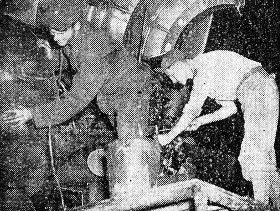 Two GI mechanics who do all their sleeping in daylight are servicing a C-46 at night under floodlights. All night long the
"mechs" keep doggedly at their work, in all types of weather. Through such efforts turnaround time -
refueling, servicing,
unloading, re-loading - is kept to a minimum.
Two GI mechanics who do all their sleeping in daylight are servicing a C-46 at night under floodlights. All night long the
"mechs" keep doggedly at their work, in all types of weather. Through such efforts turnaround time -
refueling, servicing,
unloading, re-loading - is kept to a minimum.
|
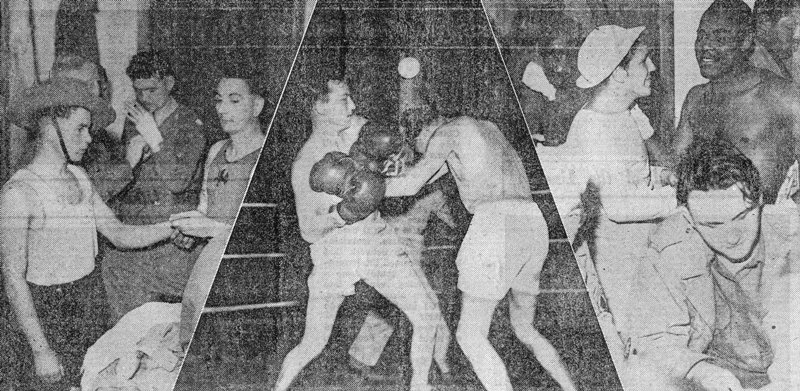 A boxing tourney, featuring bouts between Yanks and members of a British infantry division, was a sports highlight in
Assam. The tournament was staged at the 1333 BU. At the left are Sgt. Fred Lewis of South Wales, and Sgt. Mat Cooney,
Liverpool, two of the British entrants, in their dressing room. In the center, Sgt. Alan Davis, Shreveport, La., beats
out a decision over his tricky opponent, Pvt. Jerry Shillman, Killarney, Ireland. At the right are Pvts. George Holt,
Chicago, and Charlie Wright, Texarkana, Tex., in the Yank dressing room. The Americans won six out of seven bouts.
A boxing tourney, featuring bouts between Yanks and members of a British infantry division, was a sports highlight in
Assam. The tournament was staged at the 1333 BU. At the left are Sgt. Fred Lewis of South Wales, and Sgt. Mat Cooney,
Liverpool, two of the British entrants, in their dressing room. In the center, Sgt. Alan Davis, Shreveport, La., beats
out a decision over his tricky opponent, Pvt. Jerry Shillman, Killarney, Ireland. At the right are Pvts. George Holt,
Chicago, and Charlie Wright, Texarkana, Tex., in the Yank dressing room. The Americans won six out of seven bouts.
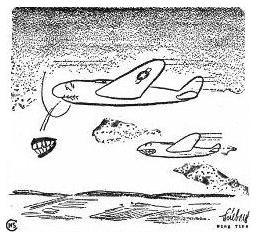
|
Conducts His Staff Meetings
Like Former Sales Confabs
Started Flying as a Hobby; Flew for ATC when Civilian
KUNMING, CHINA - When Maj. Wayne M. Gundry, base CO, came into the Army he brought with him a lot of habits he had picked up as district manager of General Motors Sales Corporation, Chevrolet Division, in Flint, Mich.
His staff meetings are like sales meetings, with the bossman (rations permitting) handing out an occasional round of cigars. he isn't selling Chevrolets now but he is selling the various department heads on the job they are expected to do.
He gets results, too. Department by department he finds out what's working and what's not so good. He has every section knowing what the other is doing. He makes the section chiefs work out proper coordination in their own sections and with each other.
The major is a flying CO, going out and bucking against whatever his men have to fight. Whenever one of many special missions comes, the major goes along to learn what he can about flying conditions at firsthand.
Since 1941 he's been flying actively. In April of that year he quit General Motors and went to Ryan School of Aeronautics at Hemet, Calif., as a primary flight instructor. His long background of flying-for-fun stood him in good stead there.
Later, he joined the Ferrying Command at Long Beach, Calif., and flew as a civilian. In June, 1942, he was commissioned a first lieutenant at Romulus, Mich. He was assigned to various Ferrying division bases in the U.S. and came to the ICD in June, 1944, and was made CO of a nearby base, then executive officer and later CO of this 24-hour-a-day beehive.
Quick Turnaround Earns Lieutenants Eager Beaver Title
It just goes to prove that you can't become a member of the Beaver Society without being found out. Take the case of Lts. G. C. Clement and Wm. G. N. Anderson, who'll probably be the most surprised people alive, to see this piece.
They landed their C-47 at Kunming recently, jumped out and beat it to the line mess, then filed their clearance and hurried back to the plane in time to assist unloading. Turnaround time - 40 minutes.
A week or two later, the same plane and the same crew landed at the same field. An officer checking the line watched as Lt. Clement rushed to engineering and rode the side of the refueling unit, directing it to his plane with the same beaverish activity. Turnaround time, while not clocked, was reported plenty fast.
These men earned the right to call themselves by their honorary name - Messrs. Beaver, E.
12 Hours Early for School, Now Favors GI Time System
1305 BU, CALCUTTA - Cpl. John Burnette, projectionist assigned to special service, is one GI who believes in punctuality, be it day or night.
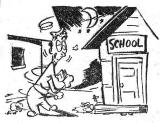
|
Cpl. Burnette, an enrollee in the off-duty education program, was eager to be present for his first class in English grammar. In fact, he got all excited about it, and lay awake in bed a few hours just thinking about it.
On the day of the scheduled class, Burnette rushed into special service at 5:30 a.m. and, panting hard, looked around, puzzled.
"Where's the class? Where's the class?" he inquired hastily. "School's locked up. Nobody down there."
Sgt. J. R. Smutz, who happened to be in the compound at the time was just as puzzled. "What class?" he asked.
"The schedule shows that 'English Grammar' meets at 5:30, but nobody's down there."
Smutz could not help laughing. "That schedule, my friend," he explained, "says the English Grammar class meets at 5:30 p.m., not a.m.
Are Lieutenants Tycoons? School Nominee Queries
Illinois State Statute Forbids Judge White To Take 'Paying' Job
1348 BU, BURMA - Pfc. Robert C. White, of the legal and claims department at this base, turned down the opportunity to join the ranks of the congressional-made gentlemen because they, the said officers and gentlemen, are working for the government for a profit.
Now, before a deluge of letters from ICD second lieutenants floods the mail asking where this "profit" they receive has been these many months, it is well to explain.
In 1938, Pfc. White was elected county judge of Montgomery County, Ill. He was re-elected in 1942 and he hopes to change his khakis for judge's robes before too many more years have passed.
When White entered the Army in June, 1943, he had an opportunity to go to OCS, but the Illinois state law, which he had been upholding, says that no man may hold a state office and also hold a position of profit for the federal government. The state supreme court held that an army officer is working for profit - so White remained a private.

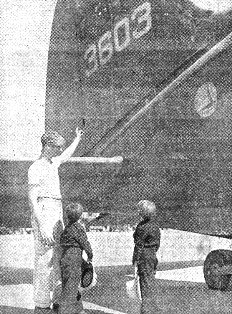 After watching No. 603, a C-46, wing her way over their homes en route to China, Master Chester Morris and David McCrea
came to the field for a close-up view before the old ship was retired. S/Sgt. Theodore J. Tomski, crew chief, showed the
young men what made the Commando tick.
After watching No. 603, a C-46, wing her way over their homes en route to China, Master Chester Morris and David McCrea
came to the field for a close-up view before the old ship was retired. S/Sgt. Theodore J. Tomski, crew chief, showed the
young men what made the Commando tick.
|
Visit Ship Which Had Passed Their Home Daily as it Finished Run
1333 BU, ASSAM - Young Masters Chester Morris and David McCrea, two British children who live near here, had sweated out No. 603, a battered C-46, a good many times in the past year.
The recognized the war-worn old Curtiss Commando by the name "Censored," which she bore on her nose. Throughout the year they saw old "Censored" depart for China sometimes twice in one day.
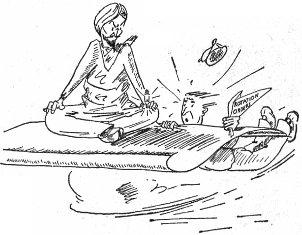 "Aw, please, just as far as New York!"
"Aw, please, just as far as New York!"
|
"Censored" established a record while they watched her. In all, she passed over their homes 844 times in less than a year as she made her 422 round trips over the Hump.
But now, "old horse," as the crew called her, was ready for the glue factory. She needed a complete overhaul at the depot. The two young masters came out to the field for a last look at her. S/Sgt. Theodore J. Tomski, crew chief, gave "Censored" the once over with the two.
As they had never before seen an airplane of this type on the ground, they asked numerous questions, some of which would probably have stopped the manufacturer.
After the sergeant's explanation of what made "Censored" tick, six-year-old Chester summed it all up by saying, "The airplane is quite a remarkable invention." David nodded his head in agreement.
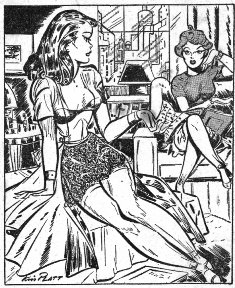 "He says he's been in action twice - there was a sale of lighters at his PX . . ."
"He says he's been in action twice - there was a sale of lighters at his PX . . ."
|
1347 BU, INDIA - "One Sunday morning when it looked like rain . . " Capt. Danny McGuire was sleeping peacefully, dreaming of the "wild blue yonder," when about 3 a.m. he was rudely awakened from his pleasant slumber and reverie.
"You aircraft's ready, Captain," said an alert CQ.
"My aircraft's ready ? I know it's Sunday and it's time for me to pilot, but I don't think I need a ship," came the quick answer from the now wide awake Danny McGuire.
The CQ departed in confusion when he noticed the emblem of the cross on Sky Pilot-Chaplain McGuire's shirt.
Another Record !
1345 BU, INDIA - A new base record was established here last week as planes of the 1345 hopped the Hump with more supplies, in less time, than ever before in the short history of this base. Lt. Col. Silas A. Morehouse, CO, in a brief statement commended air and ground crews for their tireless work and unceasing effort in making this achievement possible. Actual figures are not releasable, but the new record is almost double the previous mark.
HUMP EXPRESS is the official newspaper of the India-China Division, Air Transport Command, APO 192, c/o Postmaster, New York, N.Y., and is published by its Public Relations office. Camp Newspaper Service and Army Newspaper Service features are used, reproduction of which is prohibited without permission of CNS and ANS, 205 East 42nd St., New York, 17, N.Y. Other material is submitted by staff members, ICD-ATC base Public Relations sections and other soldier correspondents. Printed weekly by the Hindusthan Standard, 3 Burman St., Calcutta, India, and distributed each Thursday. Passed by U.S. Press Censor for mailing.
| Military transport schedules over India for cargo, personnel and mail . . . maximum tonnage of essential war materials over the Hump . . . movement of troops and supplies in support of tactical operations in China . . . evacuation of the sick and wounded - these are the missions of ICD-ATC. |

FEBRUARY 15, 1945
Original issue of HUMP EXPRESS shared by CBI veteran Steven C. King, author of Flying the Hump to China.
Copyright © 2006 Carl Warren Weidenburner
TOP OF PAGE PRINT THIS PAGE ABOUT THIS PAGE E-MAIL YOUR COMMENTS
PREVIOUS ISSUE HUMP EXPRESS BASE NEXT ISSUE